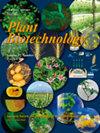Recent advances in steroidal glycoalkaloid biosynthesis in the genus <i>Solanum</i>
IF 1.1
4区 生物学
Q4 BIOTECHNOLOGY & APPLIED MICROBIOLOGY
引用次数: 1
Abstract
Steroidal glycoalkaloids (SGAs) are specialized metabolites found in members of Solanum species, and are also known as toxic substances in Solanum food crops such as tomato (Solanum lycopersicum), potato (Solanum tuberosum), and eggplant (Solanum melongena). SGA biosynthesis can be divided into two main parts: formation of steroidal aglycones, which are derived from cholesterol, and glycosylation at the C-3 hydroxy group. This review focuses on recent studies that shed light on the complete process of the aglycone formation in SGA biosynthesis and structural diversification of SGAs by duplicated dioxygenases, as well as the development of non-toxic potatoes through genome editing using these findings.Solanum</i>甾体糖生物碱生物合成研究进展
甾体糖生物碱(SGAs)是在茄属植物中发现的特殊代谢物,也被称为茄属粮食作物中的有毒物质,如番茄(茄属)、马铃薯(茄属)和茄子(茄属)。SGA生物合成可分为两个主要部分:甾体苷元的形成(源自胆固醇)和C-3羟基上的糖基化。本文重点综述了近年来研究SGA生物合成中糖元形成的完整过程和通过重复双加氧酶使SGA结构多样化的研究,以及利用这些发现通过基因组编辑开发无毒马铃薯的研究。
本文章由计算机程序翻译,如有差异,请以英文原文为准。
求助全文
约1分钟内获得全文
求助全文
来源期刊

Plant Biotechnology
BIOTECHNOLOGY & APPLIED MICROBIOLOGY-PLANT SCIENCES
CiteScore
2.90
自引率
18.80%
发文量
45
审稿时长
6-12 weeks
期刊介绍:
Plant Biotechnology is an international, open-access, and online journal, published every three months by the Japanese Society for Plant Biotechnology. The journal, first published in 1984 as the predecessor journal, “Plant Tissue Culture Letters” and became its present form in 1997 when the society name was renamed to Japanese Society for Plant Cell and Molecular Biology, publishes findings in the areas from basic- to application research of plant biotechnology. The aim of Plant Biotechnology is to publish original and high-impact papers, in the most rapid turnaround time for reviewing, on the plant biotechnology including tissue culture, production of specialized metabolites, transgenic technology, and genome editing technology, and also on the related research fields including molecular biology, cell biology, genetics, plant breeding, plant physiology and biochemistry, metabolic engineering, synthetic biology, and bioinformatics.
 求助内容:
求助内容: 应助结果提醒方式:
应助结果提醒方式:


